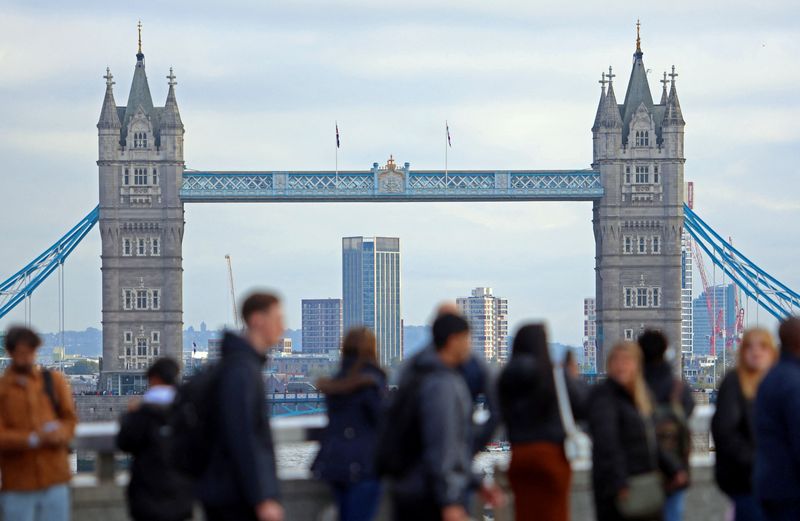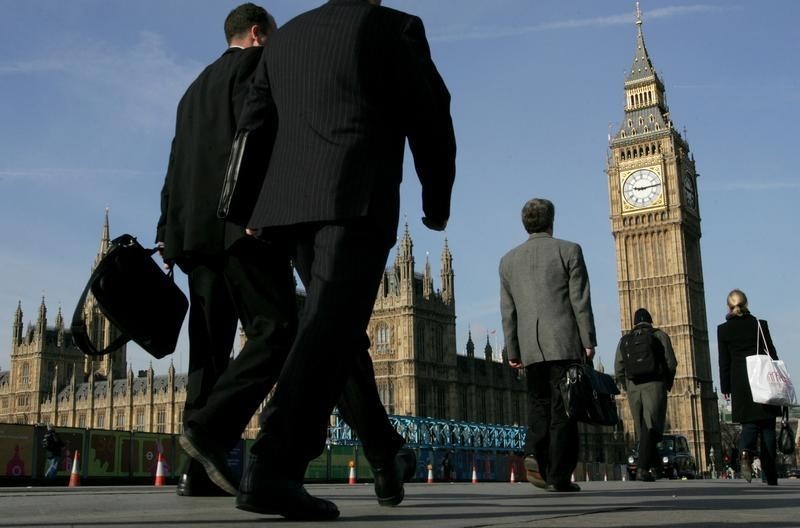By William Schomberg and Suban Abdulla
LONDON (Reuters) -British pay rose by more than expected in the three months to October, official data showed on Tuesday, prompting investors to further rein in bets on Bank of England interest rate cuts next year, despite warning signs of a slowdown in the economy.
Average weekly earnings, excluding bonuses, were 5.2% higher in the three months to the end of October than a year earlier, the Office for National Statistics said.
A Reuters poll of economists had mostly forecast a rise of 5.0%.
"Today’s data release will do little to shift the Bank’s focus away from worrying about high inflation to more towards worrying about weak activity," Ashley Webb, UK economist at Capital Economics, said.
Sterling jumped by more than a third of a cent against the U.S. dollar after the figures were published.
Investors pared back BoE rate cut bets to fully price in just two quarter-point cuts in borrowing costs between now and the end of 2025.
The central bank is widely expected to keep interest rates on hold on Thursday after its December meeting as it waits to see the impact of finance minister Rachel Reeves' Oct. 30 budget - and its higher costs for employers - on the jobs market.
Last week, official data showed Britain's economy shrank in September and October in the run-up to the budget - the first back-to-back declines in output since 2020.
A survey of businesses published on Monday showed businesses cut staffing in November by the most since the COVID pandemic.
The increase in the pace of regular wage growth - which sped up from 4.9% in the three months to September - ended a steady deceleration that began in mid-2023.
CHALLENGES REMAIN
In the private sector alone - watched closely by the BoE - earnings excluding bonuses rose by 5.4% in the August-to-October period, the fastest growth since the three months to May this year, the ONS figures showed.
Rob Wood, chief UK economist with Pantheon Macroeconomics, questioned whether pay growth really was as strong as it appeared, saying it might prove to be a correction for oddly weak readings in recent months.
Recent business surveys have suggested a fall in demand for staff after Reeves included a 25 billion-pound ($31.8 billion)increase in social security contributions paid by employers in her budget.
The ONS said on Tuesday that provisional data from Britain's tax office showed employers cut 35,000 staff from their payrolls in November.
It also said job vacancies decreased by 31,000 in the three months to November to 818,000 compared to the previous quarter, but remained 22,000 above their pre-pandemic level in January-March 2020.
Separate data showed the jobless rate held at 4.3% in the three months to October.
But the survey used for calculating the unemployment rate is in the process of being overhauled after response rates fell too low to be a reliable gauge of the jobs market.
"An ongoing challenge for the Bank of England is that it cannot be completely sure about the state of the labour market until the ONS resolves the data issues affecting the Labour Force Survey," Gora Suri, an economist at PwC UK, said.

"Until then, to some extent, it will have to continue flying blind, and rely upon a broad suite of indicators to evaluate the state of the labour market."
($1 = 0.7873 pounds)
